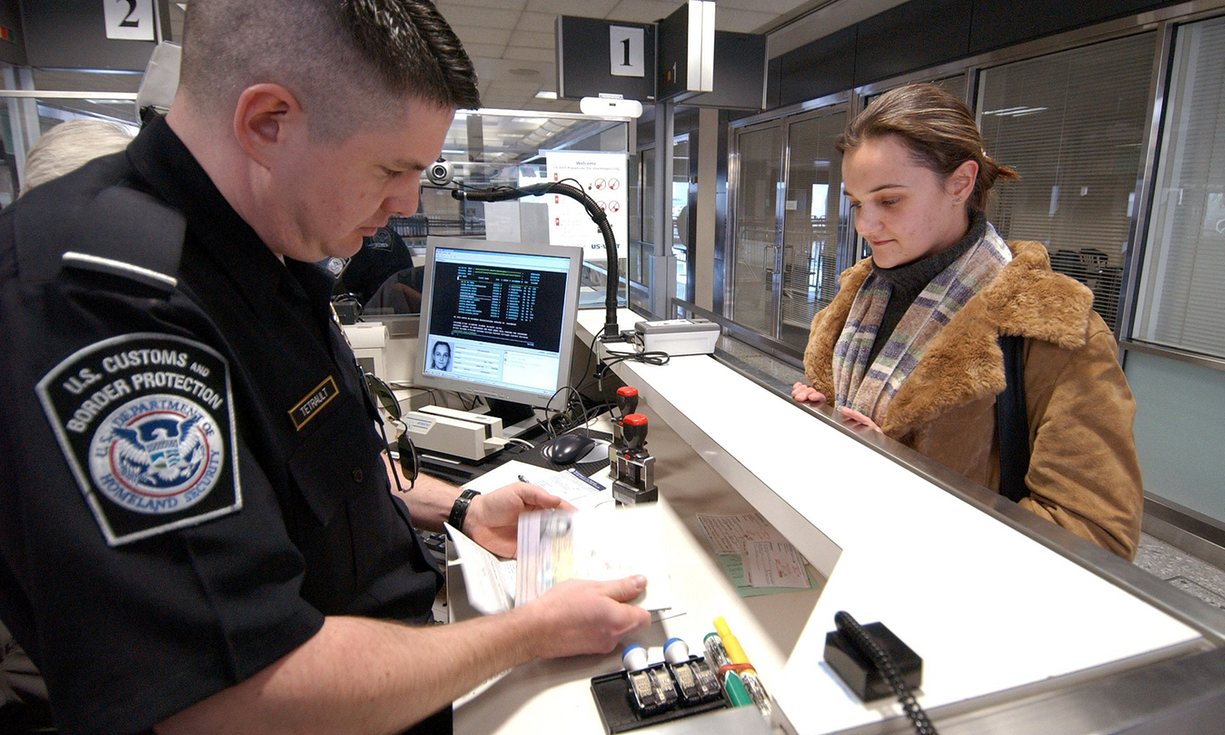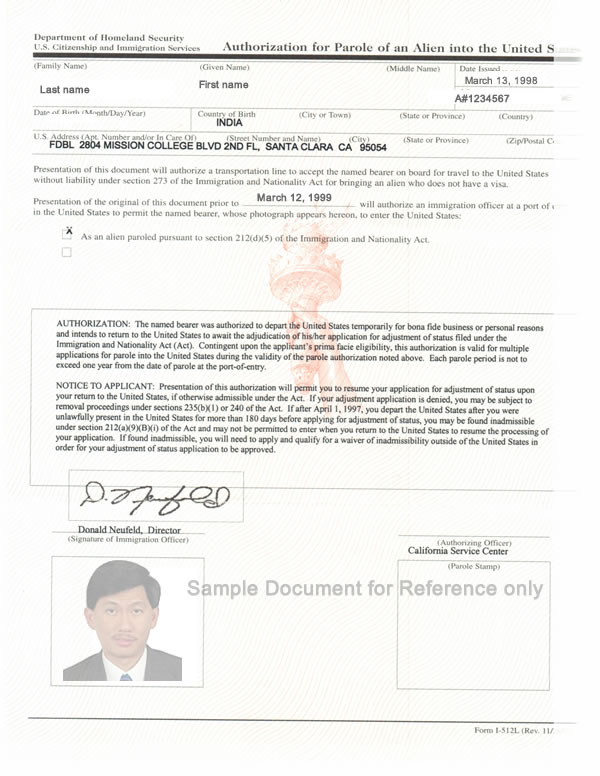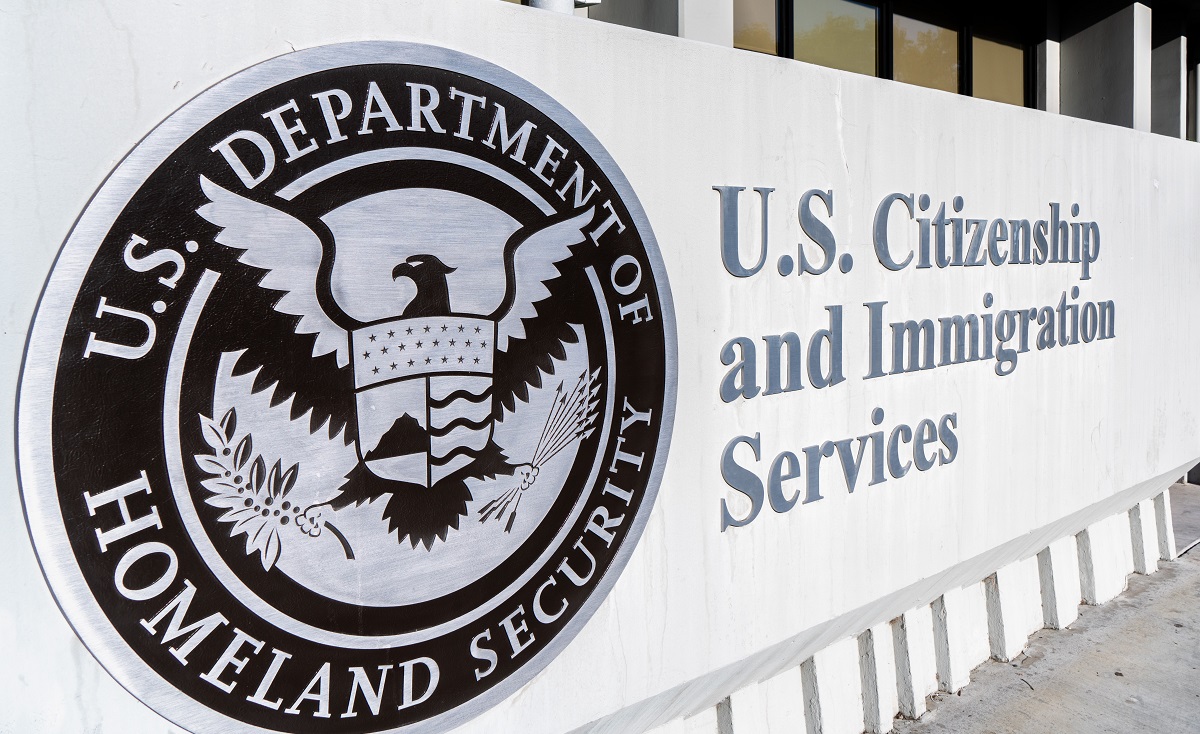
During the adjustment of status process, the applicant remains in the United States while waiting for their green card. But it can take several months to receive status as a permanent resident after filing Form I-485, Application to Adjust Status. Many applicants may want (or need) to travel abroad during this time for the purpose of visiting family, taking a vacation, or even tending to urgent matters. However, leaving without the proper documentation will likely put the beneficiary's adjustment of status application in jeopardy. Generally, an adjustment applicant that leaves the United States without an advance parole travel document will abandon the I-485 application and will have trouble re-entering.
Why is an advance parol travel document so important for I-485 applicants?
How do I request advance parole with my adjustment of status case?
How much does advance parole cost?
What can I do if there is an urgent need to travel abroad?
Does advance parole guarantee my re-entry to the U.S.?
What else should I know about my advance parole travel document?
Does every adjustment of status applicant need advance parole?
How can I get help with this process
Why I-485 Applicants Must Obtain Advance Parole Travel Documentation
Non-citizens applying for a green card through adjustment of status generally must be approved for advance parole prior to leaving the United States in order to avoid the termination of their pending application for adjustment. Additionally, advance parole may be necessary to re-enter the U.S.
With a little planning, the adjustment of status applicant can obtain an advance parole document and easily avoid these problems. Advance parole for adjustment of status applicants resolves two issues:
- Allows the adjustment of status applicant to return to the U.S. after travel abroad without obtaining a visa; and
- Preserves a pending adjustment of status application (Form I-485) already filed with USCIS.
Typically, anyone with a pending I-485 that anticipates a need to leave the United States (even for a day) should obtain an advance parole travel document, but there are some exceptions to the requirement.
How to Apply for Advance Parole
Obtaining an advance parole travel document is fairly simple, particularly if you apply at the time of filing Form I-485, Application to Adjust Status.
Advance Parole Application Package
Adjustment of status applicants may use Form I-131, Application for Travel Document, to request Advance Parole. When preparing the advance parole application package, applicants should include all of the following items:
- Prepared and signed Form I-131, Application for Travel Document
- Copy of a government-issued identity document (with photo, name and date of birth) such as an Employment Authorization Card (EAD) or passport
- Two identical passport-style color photographs
- Copy of I-485 receipt notice (Form I-797C, Notice of Action) if I-485 was previously filed and is still pending
You can download the application and filing instructions from the USCIS website. Applicants that want some additional reassurance that their application is prepared correctly can use the CitizenPath. CitizenPath provides simple, step-by-step instructions and even guarantees that USCIS will approve the application. There is no sign up or fee to get started. You pay upon completion. Learn more about the Travel Document Package >
In most cases, there is no interview associated with the Form I-131 application.
When to Submit the I-131 Application
You may submit Form I-131 at any time that I-485 is pending. However, it's typically easiest (and fastest) to file Form I-131 concurrently with Form I-485
You may submit Form I-131 to request an advance parole travel document at the same time you submit your green card application. This is the quickest way to get your application in the queue for processing. If there's any chance you will travel while Form I-485 is pending, we recommend that you submit the application concurrently.
However, you may file Form I-131 at a later date if necessary. You will need the Form I-485 receipt number so that USCIS can link your case. We've found that I-131 applications submitted after the initial I-485 filing take longer to process.
Advance Parole for Adjustment of Status Applicants Fees
At the time of writing this article, there is no USCIS filing fee for Form I-131 when applying for an advance parole document based on adjustment of status. Normally, the Form I-131 fee for an advance parole travel document is $575. Specifically, there is no USCIS fee for advance parole if you filed a Form I-485 (adjustment of status application) on/after July 30, 2007, with a fee, and that I-485 application is still pending.
However, USCIS has announced a new fee structure that will change the filing fee for adjustment of status applicants. Once this new fee structure is implemented, I-485 will pay the full fee of $660 when filing Form I-131.
When filing Form I-131 for advance parole with a pending adjustment application, we recommend that you include a cover letter to explain why no fee is included. View a sample cover letter for Advance Parole >
Urgent Requests for an Advance Parole Travel Document
Again, if there's any chance you may need to leave the United States while Form I-485 is pending, it's best to apply for advance parole at the time of submitting Form I-485.
USCIS processing times for Form I-131 are currently greater than six months for most cases. This could be a problem if you’re traveling for an extremely urgent situation. USCIS may expedite your case if you have a dire emergency and can evidence the urgent need to travel. USCIS is willing to consider an emergency request for advance parole on a case-by-case basis. You will need to provide evidence to support the emergency request (e.g. medical documentation, death certificate). If you are preparing your Advance Parole application through CitizenPath, we can also provide more detailed directions in your filing instructions.
What You Should Know About Advance Parole
An advance parole travel document is not a guarantee for re-entry to the United States. You are still subject to the standard immigration inspection at a port of entry to determine admissibility into the U.S.
If you have any period of unlawful presence in the U.S., consult with an attorney before filing Form I-131 or traveling abroad. Unlawful presence can include time after unlawfully entering the U.S. or time in the U.S. with an expired visa. If this may apply to you, speak to an experienced immigration attorney before attempting to request advance parole.
Generally, asylees and refugees should not travel to the country you claimed persecution. By returning to that country, your actions suggest that you do not fear persecution. Your application will be denied and could negatively affect your asylum/refugee status in the U.S. In some cases, there are legitimate reasons for returning to the country you claimed persecution. If this applies to you, please speak to an experienced immigration attorney before filing Form I-131.
Traveling with Advance Parole
Known formally as Form I-512L, Authorization for Parole of an Alien into the United States, the advance parole document, is often printed on a standard, letter-size piece of paper. It is generally valid for a period of one year. However, advance parole travel should be limited to a period of less than 90 days.
Applicants that applied for employment authorization concurrently may receive an Employment Authorization Card with “Serves as I-512 Advanced Parole" printed on the front.

Upon receiving the document from USCIS, review it to confirm all of the information is correct. An advance parole document will also include the last day that it may be used to re-enter the U.S. Be sure that your travel is complete and that you return before this date.
Take the original AP document with you when you leave the United States. You’ll need to present it before getting on a plane, ship, bus, or train headed back to the U.S. and to the Customs and Border Protection officer when you arrive.
When traveling with advance parole as an adjustment of status applicant, remember to:
- Take your original Advance Parole Document
- Take a photocopy of the I-797C Notice of Action confirming that your I-485 application was accepted
- Return before the deadline on your Advance Parole Document – leave extra time in case of travel delays
Exceptions to Advance Parole Requirements
In certain situations, adjustment of status applicants are not required to obtain an advance parole document. If you hold a valid H-1, H-4, K-3, K-4, L-1, L-2, V-2, or V-3 visa or status, you may travel without advance parole approval provided that you maintain your status. For example, you don’t need advance parole if you are traveling for the same employer that sponsored your H or L visa. The H or L status must be valid, and you must have evidence that you filed an adjustment of status application. Carry the Form I-797C Notice of Action that confirms you have filed Form I-485.
However, obtaining advance parole may be a useful strategy even if it isn't "required." For example, an H-1B worker may also have a pending adjustment of status case. If an H-1B renewal is denied while the beneficiary is outside the U.S., they will not be able to re-enter with H-1B status to resume the green card application process. By applying for and receiving an advance parole travel document before departing, that person has a backup strategy to re-enter the U.S. and finish adjustment of status (regardless of H-1B status).
About CitizenPath
CitizenPath provides simple, affordable, step-by-step guidance through USCIS immigration applications. Individuals, attorneys and non-profits use the service on desktop or mobile device to prepare immigration forms accurately, avoiding costly delays. CitizenPath allows users to try the service for free and provides a 100% money-back guarantee that USCIS will approve the application or petition. We provide support for the Adjustment of Status Package (Form I-485), Travel Document Package (Form I-131), and several other immigration services.
Want more immigration tips and how-to information for your family?
Sign up for CitizenPath’s FREE immigration newsletter and
SAVE 10%
on our immigration services






